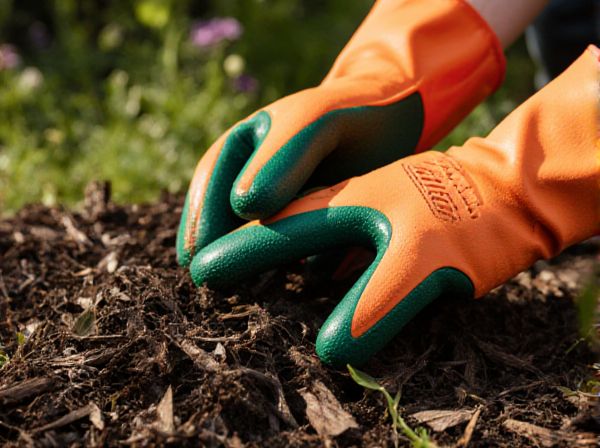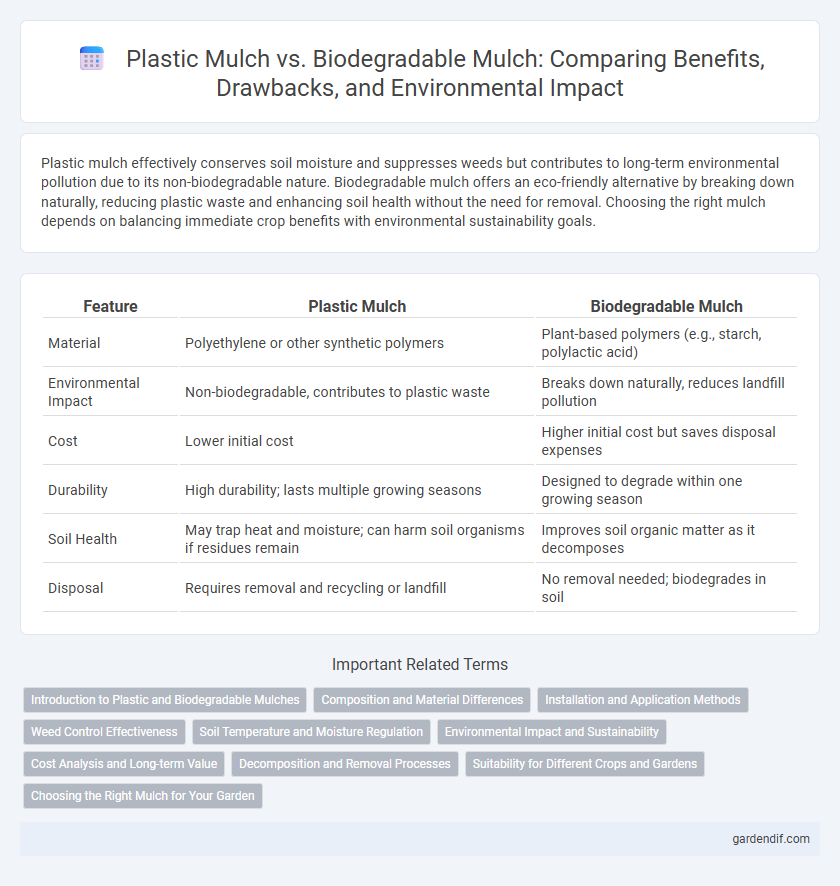
Plastic mulch vs biodegradable mulch Illustration
Plastic mulch effectively conserves soil moisture and suppresses weeds but contributes to long-term environmental pollution due to its non-biodegradable nature. Biodegradable mulch offers an eco-friendly alternative by breaking down naturally, reducing plastic waste and enhancing soil health without the need for removal. Choosing the right mulch depends on balancing immediate crop benefits with environmental sustainability goals.
Table of Comparison
| Feature | Plastic Mulch | Biodegradable Mulch |
|---|---|---|
| Material | Polyethylene or other synthetic polymers | Plant-based polymers (e.g., starch, polylactic acid) |
| Environmental Impact | Non-biodegradable, contributes to plastic waste | Breaks down naturally, reduces landfill pollution |
| Cost | Lower initial cost | Higher initial cost but saves disposal expenses |
| Durability | High durability; lasts multiple growing seasons | Designed to degrade within one growing season |
| Soil Health | May trap heat and moisture; can harm soil organisms if residues remain | Improves soil organic matter as it decomposes |
| Disposal | Requires removal and recycling or landfill | No removal needed; biodegrades in soil |
Introduction to Plastic and Biodegradable Mulches
Plastic mulch, typically made from polyethylene, offers effective weed control, moisture retention, and soil temperature regulation but poses environmental challenges due to its persistence and disposal issues. Biodegradable mulch, composed of materials like polylactic acid or starch blends, provides similar agronomic benefits while decomposing naturally, reducing plastic waste and promoting sustainable farming practices. Both mulch types impact soil health, crop yield, and environmental sustainability differently, influencing farmers' mulch selection based on goals and regulatory considerations.
Composition and Material Differences
Plastic mulch typically consists of polyethylene or other non-biodegradable polymers, providing durable ground cover that suppresses weeds and conserves soil moisture. Biodegradable mulch is made from natural materials such as starch-based polymers, cellulose, or other plant-derived substances designed to break down into organic matter after use. The fundamental difference lies in plastic mulch remaining intact for multiple growing seasons, while biodegradable mulch decomposes, reducing environmental impact and eliminating the need for removal.
Installation and Application Methods
Plastic mulch typically requires precise installation using specialized machinery to ensure even coverage and secure edges, enhancing weed control and moisture retention. Biodegradable mulch often allows for simpler application methods, such as manual laying or using standard mulch layers, reducing labor and machinery costs. Both types are compatible with drip irrigation systems, but biodegradable mulch eliminates the need for removal, streamlining post-harvest field management.
Weed Control Effectiveness
Plastic mulch provides superior weed control by creating an impermeable barrier that blocks sunlight, preventing weed germination and growth. Biodegradable mulch offers moderate weed suppression but may degrade prematurely, reducing its effectiveness over time. Studies show plastic mulch maintains consistent weed control throughout growing seasons, while biodegradable mulch effectiveness varies with environmental conditions.
Soil Temperature and Moisture Regulation
Plastic mulch enhances soil temperature by absorbing and retaining heat, creating optimal growing conditions and accelerating crop development. It effectively conserves soil moisture by reducing evaporation, which supports consistent hydration levels. Biodegradable mulch also moderates soil temperature and retains moisture but gradually decomposes, enriching soil health while minimizing plastic waste.
Environmental Impact and Sustainability
Plastic mulch contributes significantly to soil pollution and microplastic contamination due to its non-biodegradable nature, resulting in long-term environmental degradation. Biodegradable mulch, derived from renewable resources, decomposes naturally, enhancing soil health and reducing landfill waste, thereby promoting sustainable agricultural practices. Choosing biodegradable mulch supports ecosystem balance by minimizing harmful residues and lowering carbon footprints compared to conventional plastic mulch.
Cost Analysis and Long-term Value
Plastic mulch typically offers lower upfront costs compared to biodegradable mulch, making it a popular choice for short-term agricultural projects. Biodegradable mulch, while having higher initial expenses, reduces labor and disposal costs by naturally decomposing, which enhances long-term economic value. Evaluating the total cost of ownership, including environmental impact and soil health benefits, favors biodegradable mulch for sustainable, cost-effective farming practices over time.
Decomposition and Removal Processes
Plastic mulch requires manual removal after use, often leading to labor-intensive disposal and environmental concerns due to its slow decomposition rate, which can take hundreds of years. Biodegradable mulch breaks down naturally in the soil through microbial activity within one growing season or slightly longer, reducing waste and eliminating the need for retrieval. The decomposition process of biodegradable mulch improves soil quality by adding organic matter, while plastic mulch remnants can cause soil contamination and hinder long-term soil health.
Suitability for Different Crops and Gardens
Plastic mulch offers excellent weed control and moisture retention, making it suitable for high-value crops like vegetables and fruits that require consistent soil conditions. Biodegradable mulch is ideal for organic gardens and crops with shorter growing seasons, as it reduces labor by decomposing naturally and improving soil health. Selecting between these mulches depends on crop type, garden size, and environmental sustainability goals.
Choosing the Right Mulch for Your Garden
Plastic mulch offers excellent weed control and moisture retention but can contribute to environmental pollution if not disposed of properly. Biodegradable mulch decomposes naturally, enriching the soil and reducing waste, making it ideal for sustainable gardening practices. Selecting the right mulch depends on your garden's environmental goals, budget, and maintenance preferences.
Plastic mulch vs biodegradable mulch Infographic

 gardendif.com
gardendif.com